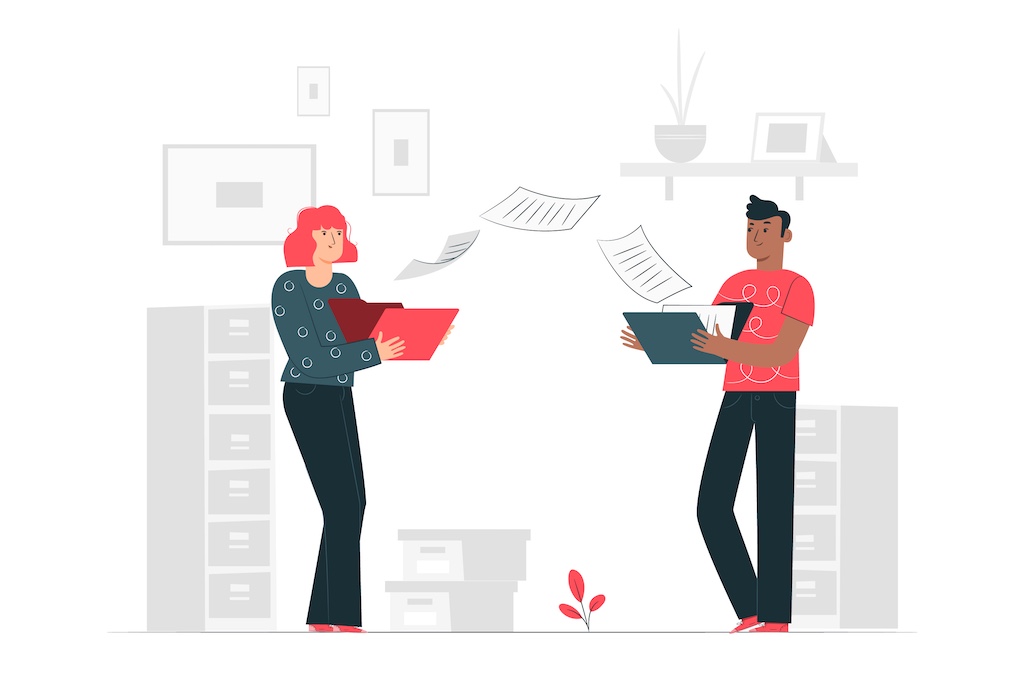When you’re handling important business communication, you want to be sure your messages stay private and reach the right people. Email is fast and easy, but it can sometimes be risky when sending sensitive information because hackers can intercept messages. On the other hand, faxing might seem old-fashioned, but online fax services offer a secure way to send documents without the usual worries.
Using online fax for business communication is often safer than email, especially when you need to protect confidential data like contracts or legal papers. Fax transmissions are harder to hack and many online fax providers add extra security to keep your information safe. So, if you’re sending sensitive files, online faxing might be the better choice compared to regular email.
I want to help you figure out when it makes sense to use online fax instead of email for your work. Keep reading to learn how to choose the right method to protect your business communication and avoid problems down the road.
- Key Differences Between Fax and Email
- When to Use Online Fax for Secure Communications
- Benefits of Online Faxing Over Traditional Fax and Email
- Selecting an Online Fax Service Provider
- Implementing Online Faxing in Your Business
- Frequently Asked Questions
- What are the security differences between faxing and emailing confidential documents?
- Why might a business choose fax over email for sending sensitive information?
- Can I securely fax my personal details, like a Social Security number?
- What are the pros and cons of faxing as opposed to emailing for business communications?
- How has online faxing modernized traditional fax machine usage in a business setting?
- What reasons do companies have for continuing to use fax services in the digital age?
Key Differences Between Fax and Email

When deciding between fax and email, it helps to know how each sends information, keeps it safe, and holds up in legal situations. Each one works in a different way and fits certain needs better, especially for businesses that handle sensitive info.
Fax uses a phone line or the internet to send scanned copies of paper documents. Traditional fax machines scan your document and send it over a telephone connection. On the other hand, online fax services let you send and receive faxes through email or a web app without needing a physical fax machine.
Email sends digital files over the internet instantly. You can attach PDFs, images, or text, and send them to anyone worldwide. But because email depends on the internet, if there are delays or interruptions, your message might not get through right away.
Fax technology is great when you need to send exact printed copies, especially for official papers or forms. Email is better for quick communication or sharing editable files.
Fax offers stronger security because it uses phone lines or limited internet exposure, making it harder for hackers to intercept. When you send a fax, it’s less likely to be caught in a data breach because the connection is point-to-point.
Email, while convenient, travels over the internet and can be vulnerable to cyberattacks like phishing or hacking. Sensitive information—like patient records—needs extra protection when sent by email, such as encryption.
If you worry about data breaches or want to ensure your documents don’t get seen by the wrong person, faxing is often the safer choice. Some modern fax services combine fax with internet speed and use encryption for more protection.
Fax documents are often seen as legally binding because they produce an exact copy of the original signed paper. Many industries, like healthcare or law, still require fax communication to meet regulations protecting patient information and privacy.
Email is generally accepted but can be tricky in court if you need proof the document hasn’t been altered. For compliance with laws like HIPAA (for patient info), you might need secure email systems with special safeguards.
If your business deals with legal papers or sensitive data, fax is still a reliable communication tool that meets many compliance standards better than standard email.
When to Use Online Fax for Secure Communications

Using online fax can make certain types of communication more secure and reliable. It’s especially helpful when you need proof that your message was delivered, or when you have to follow strict rules about data privacy. Choosing the right tool—like a digital fax or fax from email—depends on what you’re sending and who you’re sending it to.
When you handle sensitive business documents, like contracts, financial reports, or personal data, online faxing is a smart choice. Unlike regular email, an online fax service sends documents through a more secure channel, often encrypted during transit. This cuts down the chance of hackers intercepting your files.
A digital fax with a dedicated fax number also keeps your communication private. You won’t have to worry about information being accidentally forwarded or stored in email inboxes. Plus, you can use electronic signatures or digital signatures with fax to make sure the documents you send are official and verifiable.
Certain industries have strict regulations that require you to protect your documents, like HIPAA for healthcare or GDPR for data privacy. Online fax fits perfectly here because it helps you comply with these laws.
Internet faxing services often include encryption and secure storage options to protect your documents. Many also provide detailed logs of your fax activity, showing who sent or received documents and when. This kind of tracking is crucial for audits or legal reviews.
If your business must follow rules about data handling, using a fax service designed for compliance takes the pressure off you.
Doctors, clinics, law offices, and courts still rely heavily on fax because it meets their need for secure, direct document delivery. Medical records, consent forms, court filings, and contracts often contain sensitive info that can’t be exposed.
By using an electronic fax system instead of old fax machines, you speed up the process without losing security. Online fax lets you send documents from your computer or smartphone securely, and the system usually supports digital or electronic signatures that make documents official.
This way, you avoid the risks of losing paper documents and reduce the time spent shuffling papers around.
One of the biggest reasons to use online fax is that it gives you proof of delivery. Unlike email, which might get lost in spam or never opened, a fax service provides a delivery confirmation you can save.
With internet faxing, you get digital receipts that show your documents reached the recipient. These receipts include timestamps and sometimes even IP addresses. You can keep them in your records to protect your business if disputes arise.
Plus, storing fax transmissions digitally makes recordkeeping easier. You won’t have to deal with stacks of paper or worry about misplacing important files. An online fax service keeps everything organized and searchable on your device.
Benefits of Online Faxing Over Traditional Fax and Email
When you switch to online faxing, you get faster, safer, and more eco-friendly communication. It’s easier to keep your documents organized and accessible without the hassle of bulky machines or messy paperwork. Plus, online fax services bring digital features that email alone can’t match for business.
Security is a big deal when sending important business documents. Online fax services use strong encryption to protect your files as they travel over the internet. This means no one can sneak a peek or alter your documents in transit.
Unlike typical email, which can be hacked or filtered into spam, online faxing gives you a secure digital record and delivery receipt. This helps you prove that the document was sent and received safely. You can also control who accesses your files, so your sensitive info stays private.
If you want to avoid the risks of traditional fax machines or email, online faxing is a smarter choice for keeping your communications secure.
One thing I appreciate about online faxing is how it supports electronic and digital signatures. These signatures have legal weight in many countries, making online faxing an official way to send signed contracts or agreements.
When you use an online fax service, your signed documents are timestamped and stored securely. This helps if you ever need to prove the authenticity of a signature or a document down the line.
In contrast, emails often require extra verification steps, and traditional fax signatures can be harder to track. Online fax makes the whole process smoother and reliable for your business needs.
If you care about going green, online faxing is a win for the environment. Since there’s no need to print or use physical fax machines, you cut back a lot on paper waste and toner cartridges.
Online fax solutions let you send and receive faxes right from your computer or phone. This means less clutter and no more running to the fax machine or waiting by it.
Plus, keeping everything digital improves your business efficiency. You can organize, search, and share your documents easily without piles of paper. It’s a simple way to be eco-friendly while staying productive.
Selecting an Online Fax Service Provider
Choosing the right online fax service can make a big difference in how smoothly your business runs. You’ll want to focus on what features really matter to you, like security, ease of use, and how well it fits your workflow. It’s also good to know which providers have a solid reputation and what they offer.
When picking a fax service provider, security should be at the top of your list. Look for services that offer encryption during transmission and storage to keep your documents safe. Also, check if they comply with industry standards like HIPAA if you deal with sensitive info.
Ease of use matters, too. A platform with a simple app or web interface helps you send and receive faxes quickly, even on your phone. Features like automatic fax forwarding and integration with email or cloud storage can save you time.
Don’t forget the cost. Some providers charge per fax, while others offer monthly plans that include a set number of pages. Make sure you understand their pricing so you’re not hit with surprise fees.
A few companies stand out when it comes to reliable online fax services. RingCentral Fax is popular for its strong security and ability to work seamlessly with other business tools. It’s a good choice if you want something scalable.
CocoFax is another option worth considering, especially if you want a user-friendly platform that supports faxing directly from your computer or phone without needing a fax machine.
If you want something straightforward, you might try a simple internet fax service that lets you send PDFs and documents via email with fax functionality built-in.
No matter which one you pick, just make sure the service fits your business needs and keeps your documents safe.
Implementing Online Faxing in Your Business

Getting online faxing set up is simpler than you might think. It fits right into your daily business communications and helps keep everything neat and secure. You just need a few clear steps to make it work smoothly for you and your team.
Online faxing works with the tools you already use, like email and cloud storage. You don’t need any special fax machines or phone lines. Instead, you send and receive faxes directly from your computer or phone.
Many online fax services offer apps or plugins that let you fax right from your email inbox. This means you can handle faxes the same way you handle other messages—super convenient and fast.
Plus, the digital format makes it easier to share faxes across your business quickly. No more waiting by a fax machine or sorting through paper stacks. It just slides right into your existing workflows.
Keeping your fax records organized is a must, especially if you deal with sensitive info. Most online fax services automatically save your documents in secure folders. You can easily search, sort, and access past faxes whenever you need them.
This neat system helps you stay compliant with laws around data privacy and document handling, like HIPAA or GDPR, depending on your industry.
Using digital records means you won’t lose important papers or have to dig through filing cabinets. Everything’s backed up and protected, so your business is safer and better organized.
Switching to online faxing means your team will need a quick intro to the new system. Fortunately, most services are designed to be user-friendly, so training doesn’t have to take much time.
I’d recommend short sessions focused on how to send, receive, and store faxes securely. Highlight the differences from traditional faxing so everyone feels confident using the new tools.
Encourage your staff to ask questions and share tips. The easier it feels, the more smoothly your business communications will run—and that adds up to less stress for you all.
Frequently Asked Questions
When you’re deciding between faxing and emailing, there are some key points to keep in mind about security, speed, and how your information travels. It really depends on what kind of documents you’re sending and how private they need to be. Here’s a quick rundown of questions people often ask about these options.
What are the security differences between faxing and emailing confidential documents?
Faxing can be more secure than email if it’s set up right, like using a private, encrypted network. Email travels over the internet and can be vulnerable if not properly encrypted or if the wrong person gets access to your inbox.
Why might a business choose fax over email for sending sensitive information?
Many businesses trust fax because it sends documents directly to a machine or online fax service, reducing the risk of interception on insecure networks. This is especially true for industries like healthcare or law, where privacy rules are strict.
Can I securely fax my personal details, like a Social Security number?
Yes, you can securely fax personal details as long as you send the fax through a secure and encrypted line or a trusted online fax service. It’s safer than sending these details over regular email without encryption.
What are the pros and cons of faxing as opposed to emailing for business communications?
Faxing is great for official printed documents and can be more secure. On the other hand, it’s slower and less flexible than email, which works faster for digital files like PDFs and Word docs. Email also makes it easier to share images and links.
How has online faxing modernized traditional fax machine usage in a business setting?
Online faxing saves you from using bulky fax machines. You can send and receive faxes directly from your computer or phone, which is faster and more convenient. It also lets you keep digital records without scanning paper documents.
What reasons do companies have for continuing to use fax services in the digital age?
Companies stick with fax because it’s reliable, secure, and meets legal requirements in many industries. It works well for signed documents and is still widely accepted where digital signatures or emails might not be enough.
